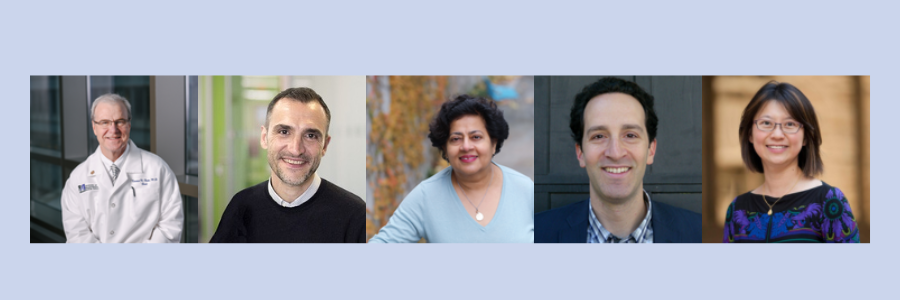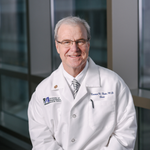Congratulations to Our Five New Board Members!
May 08, 2023
Please welcome these new members of the ASGCT Board of Directors, who will take office on June 1!

We are thrilled to introduce our five newest members of the ASGCT Board of Directors! Starting June 1, these new members will begin their three-year terms. The incoming Vice President will ascend through the presidential succession process before serving as ASGCT President in 2025-26.
Vice President (Term of Office: 2023-2026)
Terence R. Flotte, MD
Celia and Isaac Haidak Professor, Tenured Professor of Pediatrics, Executive Deputy Chancellor, Provost and Chief Research Officer, UMass Chan Medical School
Dean, T.H. Chan School of Medicine
.png.aspx)
Most of Dr. Flotte's cited research (H-index 84, Google Scholar) has focused on the biology and human use of adeno-associated virus (AAV). In 1993, he published the first successful in vivo gene transfer with AAV, showing that long-term expression in rabbits and primates was due to episomal persistence with reduced risk. This led to the first-ever human trial of AAV, which he led in 1995. He also led the first rAAV trials in alpha-1 antitrypsin and Tay-Sachs Disease, the latter showing promising clinical benefits.
Modeling the structure of the school on his own success in gene therapy, Dr. Flotte in his role as dean of the medical school has founded innovative programs and departments (in Bioinformatics, RNA Therapeutics, Systems Biology, Gene Therapy, Digital Medicine) to foster a collaborative environment across departments as well as between bench research and clinical labs. His leadership as dean has transformed UMass Medical School into an impressive center for cutting-edge research and new clinical trials. This has led to a significant increase in the amount of funding that the university has attracted, which has more than doubled since 2007, even as funding has become more difficult to obtain every year. His university leadership has helped build a world-class research institution.
Dr. Flotte's national leadership in the Association of American Medical Colleges Council of Deans, the American Society of Gene and Cell Therapy, NIH committees and as Editor-in-Chief of Human Gene Therapy has helped develop a new molecularly savvy generation of clinicians, educators, and researchers.
Hear Dr. Flotte in conversation with ASGCT president Hans-Peter Kiem, MD, PhD, on our Giants of Gene Therapy podcast. Please note that the podcast was recorded prior to the election.
Treasurer (2023-2026)
Federico Mingozzi, PhD
Chief Science & Technology Officer, Spark Therapeutics, Inc.

The goal of Dr. Mingozzi's career is the development of safe and effective gene-based treatments for genetic and acquired diseases. His academic research focused on the understanding the interactions between gene therapy vectors and host immune system, and the development and clinical translation of gene therapies based on adeno-associated virus (AAV) vectors. Key findings derived from this work include the induction of immune tolerance via liver gene transfer, the characterization of immune responses to AAV vectors in humans, and the development of strategies to overcome humoral and cell-mediated immunity to AAV. This work is fundamentally important, as it addressed hurdles of the technology that are key to the long-term safety and efficacy of in vivo gene transfer.
As part of Dr. Mingozzi's translational work, he has been involved in pioneering gene therapy trials for bleeding disorders, inherited blindness (LUXTURNA®), metabolic, neuromuscular diseases, and others. The nature of this research extended my areas of expertise into delivery platform technologies, manufacturing, regulatory aspects, and clinical trial design. The transition from academia to industry broadened his leadership experience and research interests. Currently, he leads a talented organization focused on building and progressing a pipeline of gene therapies directed to the eye, the liver, and the central nervous system. This includes work on novel delivery and therapeutic modalities and manufacturing-related activities in technical development, analytical development, and quality control. He is passionate about science, bringing life-changing therapies to patients, and training and mentoring the future generations of researchers in gene therapy.
At-Large Director (2023-2026)
Science + Education Council Chair
Punam Malik, MD
Marjory J. Johnson Chair of Gene and Cell Therapy and Professor of Pediatrics, Cincinnati Children’s Hospital Medical Center (CCHMC) and the University of Cincinnati

Dr. Malik is a physician-scientist. Her research interests lie in studying the genetic therapies for hematopoietic stem cell disorders with a focus on hemoglobinopathies. She also works on pathophysiology of sickle cell anemia (SCA) and developing targeted therapies, such as gene therapy. I have been studying gene transfer into murine and human hematopoietic stem cells (HSCs) using different viral vector platforms (γ-retroviral, foamy virus, lentivirus and adeno-associated virus vectors) and optimizing HSC gene transfer and gene editing. This has included studies on mechanisms by which genetic modification of the HSC genome affects HSC fate and its long term engraftment potential, ways to improve titers and safety of lentivirus vectors, including structure function studies and identification of novel chromatin insulator elements to reduce genotoxicity and improve engraftment specifically of genetically modified human HSC.
Dr. Malik's lab developed a potent antisickling globin by modifying the human γ-globin gene and when delivered via a lentivirus vector, it ameliorates sickling of RBCs at a much lower antisickling globin concentration, successfully ameliorating SCA with reduced intensity conditioning. She has enabled GMP translation of genetic therapies for inherited hematological disorders including immune deficiency disorders such as X-SCID, leukocyte adhesion deficiency, hemophagocytic lympho-histiocytosis, beta-thalassemia and SCA. More recently, Dr. Malik has embarked on gene editing approaches for hematopoietic disorders, and developed custom Cas9 nucleases that reduces error prone repair and promote targeted correction specifically at the Cas9 cut sites and are optimizing this approach for correcting larger genomic edits, especially in large genes with multiple mutational hot-spots, which cannot be corrected by base/prime editing.
At-Large Director (2023-2026)
Daniel E. Bauer, MD, PhD
Director of Gene Therapy Program, Staff Physician and Principal Investigator in Pediatric Hematology/Oncology, Boston Children’s Hospital and Dana-Farber Cancer Institute;
Donald S. Fredrickson, MD Associate Professor of Pediatrics, Harvard Medical School;
Principal Faculty, Harvard Stem Cell Institute;
Associate Member, Broad Institute of Harvard and MIT
.png.aspx) Dr. Bauer is a physician-scientist whose laboratory research focuses on genetic determinants of blood cell development and disease and opportunities for innovative therapies for hematopoietic disorders. He has discovered the BCL11A erythroid enhancer as a favorable target for therapeutic genome editing for the β-hemoglobinopathies sickle cell disease (SCD) and transfusion-dependent β-thalassemia (TDT), now validated by several clinical trials (NCT03745287, NCT03655678, NCT04211480, NCT03653247).
Dr. Bauer is a physician-scientist whose laboratory research focuses on genetic determinants of blood cell development and disease and opportunities for innovative therapies for hematopoietic disorders. He has discovered the BCL11A erythroid enhancer as a favorable target for therapeutic genome editing for the β-hemoglobinopathies sickle cell disease (SCD) and transfusion-dependent β-thalassemia (TDT), now validated by several clinical trials (NCT03745287, NCT03655678, NCT04211480, NCT03653247).
Dr. Bauer has developed methods for highly efficient, penetrant, and specific nuclease and base editing in human hematopoietic stem cells and advanced functional genomic methods to correlate genotypes with molecular, cellular, and organismal phenotypes with high precision and resolution. He has identified a therapeutic gene editing strategy for universal amelioration of ELANE-mutant severe congenital neutropenia, described a core NuRD subcomplex and uncovered ZNF410 as a transcription factor critical for fetal hemoglobin (HbF) repression, and demonstrated how human genetic diversity alters off-target outcomes of therapeutic gene editing. He is developing investigator-initiated clinical trials, as sponsor, for hemoglobinopathies and inherited bone marrow failure disorders.
Dr. Bauer's clinical work focuses on the care of patients with nonmalignant blood disorders. He teaches undergraduate, graduate, medical students, residents, and fellows. He directs a hospital-based gene therapy program and chair an IRB scientific review committee for cell and gene therapies. Dr. Bauer peer reviews grants and manuscripts and serve on the NHLBI SCD Advisory Committee. For the Society, he is a member of the editorial board of Molecular Therapy, chair of the Stem Cell Committee, and has served as abstract reviewer, poster reviewer, committee member, and workshop organizer.
At-Large Director (2023-2026)
Kah-Whye Peng, PhD
Professor of Oncology and director of the virus and gene therapy Toxicology and Pharmacology service lab at Mayo Clinic;
Co-founder and Chief Technical Officer of Vyriad
.png.aspx) Dr. Peng is a Professor of Oncology at Mayo Clinic and director of their virus and gene therapy Toxicology and Pharmacology service lab where she plays a pivotal role in enabling clinical translation of novel gene and virus therapeutics from bench to bedside. She is also a co-founder and Chief Technical Officer of Vyriad, where she currently leads cGMP manufacturing operations. She has a long-standing research interest in the clinical development of oncolytic viruses as anticancer therapeutics, viral vector targeting, and non-invasive imaging technologies to track cell and virus gene therapies through Imanis Life Sciences, a biotech she co-founded.
Dr. Peng is a Professor of Oncology at Mayo Clinic and director of their virus and gene therapy Toxicology and Pharmacology service lab where she plays a pivotal role in enabling clinical translation of novel gene and virus therapeutics from bench to bedside. She is also a co-founder and Chief Technical Officer of Vyriad, where she currently leads cGMP manufacturing operations. She has a long-standing research interest in the clinical development of oncolytic viruses as anticancer therapeutics, viral vector targeting, and non-invasive imaging technologies to track cell and virus gene therapies through Imanis Life Sciences, a biotech she co-founded.
Dr. Peng's PhD research was in envelope modification of retroviral vectors to redirect their tropism to B cell malignancies. Her postdoctoral research focused on engineering the envelope glycoproteins of oncolytic measles virus and vesicular stomatitis virus to display single chain antibodies to redirect virus infection. Her research lab’s seminal work on HER-2 retargeted measles viruses demonstrated the role of ligand affinity and receptor density for viral entry.
For the past 25 years, Dr. Peng has been actively involved in the clinical translation of adenovirus, adeno-associated virus, measles virus and vesicular stomatitis virus from bench to first-in-human clinical testing; supporting pharm/tox studies, manufacturing and clinical trial operations. Her leadership and role in building the oncolytic virotherapy community was recognized recently by her peers with the Golden Virus Award.